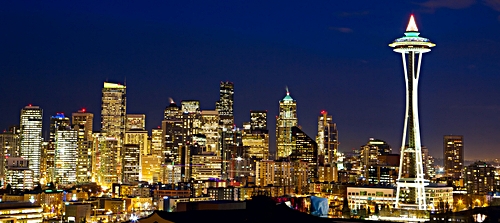Here are 4 problems with Seattle’s $15 an hour minimum wage idea

FOUR PROBLEMS: Sure, you can increase the minimum wage, Seattle, but that doesn’t guarantee good results for impoverished families.
By Shelby Sebens and Dustin Hurst | NorthwestWatchdog.org
Leaders in Seattle are poised to raise the city’s minimum wage to $15 an hour, adding to the state’s already tops-in-the-nation wage rate of $9.32 per hour.
Yet, as community organizers and labor leaders beat the drum for the massive pay increase they say will lift impoverish Americans into sustainable lifestyles, they omit some important facts about the idea. Here are four problems with the Seattle wage proposal that could turn city residents and taxpayers off to the idea:
1. A minimum wage increase doesn’t create jobs and leads more people into poverty
At 6.6. percent, Washington state’s unemployment rate is middling, sitting 29th in December 2013. Though the rate is improving, 18 states are under 6 percent, led by North Dakota — and its oil boom — at 2.6 percent.
Lifting people out of poverty requires creating policies that encourage employment and private-sector hiring, yet the Seattle proposal does neither and may actually discourage businesses from bringing on new employees.
State Sen. John Braun, R-Centralia, criticized backers of the wage-hike plan, knocking them for putting the focus on a proposal that doesn’t actually create jobs.
“If we really care about poverty, we should look at how we create jobs,” he said this week. “Nobody’s making the argument that it (the wage hike) creates jobs.”
In a 2010 article for the Southern Economic Journal, academics Joseph J. Sabia and Richard V. Burkhauser pulled the rug from underneath the idea that the wage hike ultimately will solve economic hardships for poor Americans..
“While an increase in the minimum wage will lift out of poverty the families of some low-skilled workers who remain employed, other low-skilled workers will lose their jobs or have their hours significantly cut, reducing their income and dropping their families into poverty,” the duo wrote.
Further, they added that the wage-hike idea is politically popular, but not effective in achieving its aims.
“While reducing poverty among the working poor is a laudable policy goal, the evidence suggests that minimum-wage increases have thus far provided little more than symbolic support to this population,” they wrote in the document.
2. It will cost the city of Seattle $1 million a year extra
It’s not just small businesses and low-skill workers that could feel the sting of a higher minimum-wage law. Taxpayers could be on the hook as well.
The Seattle Times reported that it will cost the city $1 million a year to pay workers, mostly part-time and seasonal staff, a $15 an hour minimum wage.
The Times also reports its unknown if a higher minimum wage would prompt labor unions to negotiate for more money for higher skilled workers, ultimately adding to that yearly price tag for Seattle taxpayers.
3. Problems are already persisting in nearby SeaTac, the first city to establish a $15-an-hour wage law
SeaTac businesses are in flux right now, unsure if they’ll have to pay workers a required $15 an hour minimum wage.
Residents voted in favor of a $15 an hour wage for businesses in and around the SeaTac airport in November, but a King County Superior Court judge has since ruled that the city of SeaTac doesn’t have the authority over the airport, which falls under the Port of Seattle jurisdiction.
That means only 1,600 of the 6,300 workers included in the ordinance are being impacted now. The Port Commission plans to consider enacting the minimum wage sometime this year. Port officials told Northwest Watchdog that the scheduling of public hearings and policy roundtables will be released soon.
Max Nelson, Freedom Foundation labor policy analyst, told Northwest Watchdog he has spoken to some business owners in the SeaTac area who are restructuring their business to avoid paying the $15 an hour wage.
But, he said, the business owners are reluctant to go public for fear of backlash from labor unions. He also said many are just waiting to see if this will impact their business.
The owner of Dollar Rental Cars told Fox News she will outsource functions, cut jobs and change schedules to deal with the higher wage law.
4. The Seattle push may be all for naught
After spending $100,000 to study the minimum wage issue, the effort could be in vain.
Braun is sponsoring legislation in the Legislature that would block cities from enacting their own wage ordinances and would leave the power solely for state lawmakers.
The Senate Republican said he is concerned that businesses could suffer under an undue administrative burden if several cities in the state enact their own wage laws.
“It’s not like business stops at the city line or the county line,” Braun said. “Making the system more complex is not going to help our situation.”
Contact Shelby Sebens at SSebens@Watchdog.org and Dustin Hurst at Dustin@Watchdog.org
The post Here are 4 problems with Seattle’s $15 an hour minimum wage idea appeared first on Watchdog.org.







